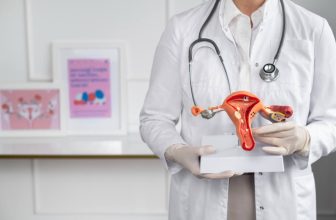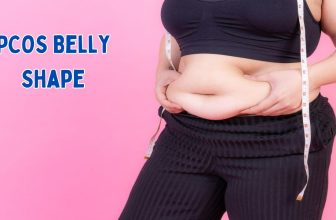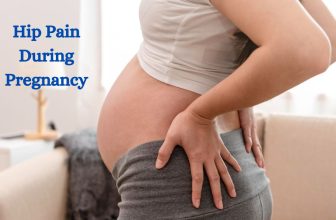The Best Foods to Eat in the First Trimester of Pregnancy
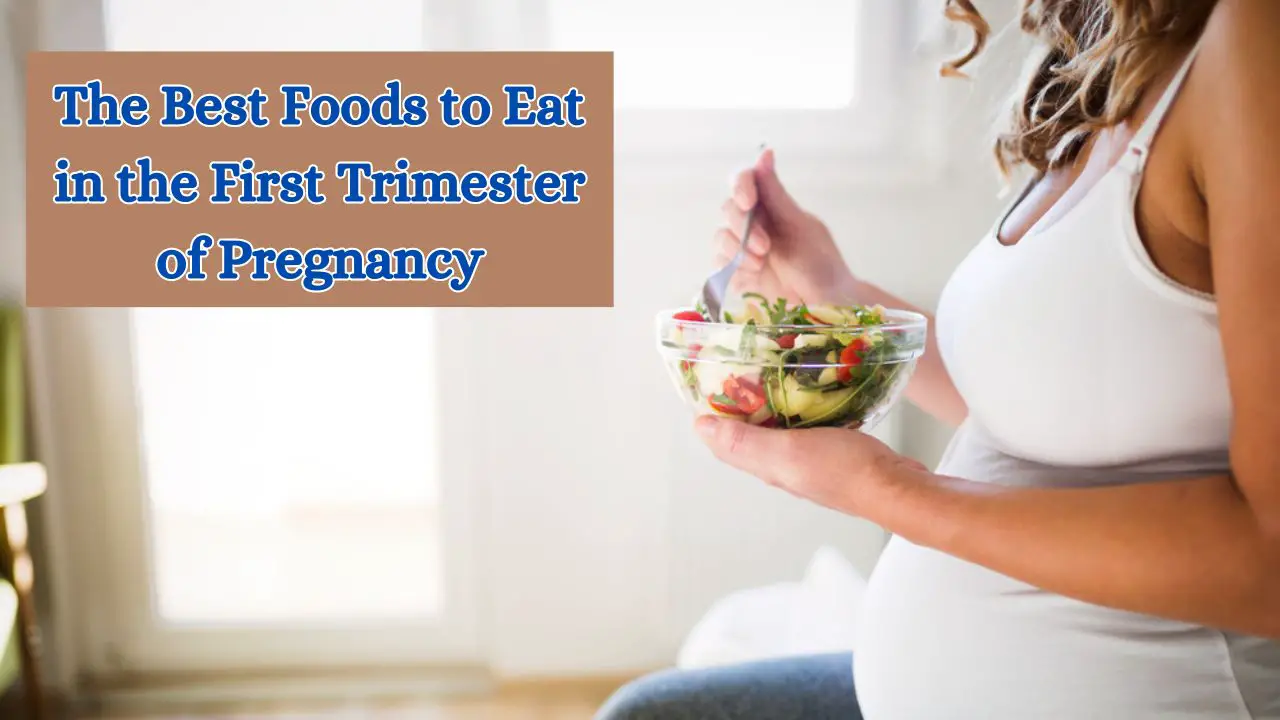
Every woman’s pregnancy journey is significant. The first trimester is vital for the unborn child’s development. As a result, pregnant women need the best foods to eat in the first trimester of pregnancy.
In these early stages, the growing baby and mother need proper nutrition. Therefore, eating nutrient-rich foods is essential.
This article will explore the best foods during the first trimester. Also, share superfoods and an eating chart. To know essential information about foods to avoid complications like miscarriage, read the whole article.
What Is the Best Food to Eat During the First Trimester?
Focus on nutrient foods during the first trimester of pregnancy to support fetal development. Include folate, iron, and vitamin B6-rich foods. Stay hydrated, along with eating frequent and small meals to help with nausea and quality of life. The first trimester is categorized by rapid cell division. In addition, in this period, your baby’s vital organs are formed. Here are some of the best foods to list during your first trimester:
Leafy Greens
Leafy greens like spinach, kale, and Swiss chard are rich in folate and vitamin B vitamins necessary for the early development of the baby’s neural tube. Intaking Folate from the beginning of pregnancy prevents neural tube defects. That makes it a vital nutrient during the first trimester.
Citrus Fruits
Oranges, grapefruits, and lemons are excellent sources to meet the need for vitamin C. These help to absorb iron. Iron prevents anemia. Anemia is a common pregnancy concern. Furthermore, vitamin C aids in the development of the baby’s bones and teeth.
Dairy Products
Dairy products like cheese, yogurt, and milk contain calcium. A baby’s teeth and bones develop more easily with the help of calcium. They are a good source of protein. Everyone knows protein is essential to a baby’s overall growth.
Lean Proteins
Lean proteins, including poultry, fish, tofu, and legumes, develop the baby’s tissues and organs. Protein increases blood volume in the mother’s body. This element also supports the growth of the placenta.
Whole grains
Whole grains like oats, brown rice, and quinoa contain high fiber. These give the mother intermittent energy. There’s also iron, magnesium, and B vitamins. Throughout the first trimester, they encourage wellness.
Berries
Antioxidants are filled in blueberries, raspberries, and strawberries. They also contain vitamin C. These components strengthen the immune system. They also protect the mother and child from dangerous free radicals.
Avocado
Avocado is a high-potassium, vitamin K, and folate-containing fruit. These are high in monounsaturated fat. 67% of their fat content is monounsaturated fat.
Nutty and seeds
Protein-rich foods include chia seeds and flaxseeds. Almonds and walnuts are high in fibre and omega-3 fatty acids. Omega-3 fatty acids aid in the development of a baby’s brain and eyes.
Eggs
Eggs contain choline and high-quality protein. It develops the baby’s brain. Make sure you boil it perfectly. Otherwise, foodborne infections impact the expectant mother.
Coconut
Coconut water, or coconut milk, is a fantastic drink. The coconut milk contains lauric acid. It helps with milk production and lactation when taken during pregnancy!
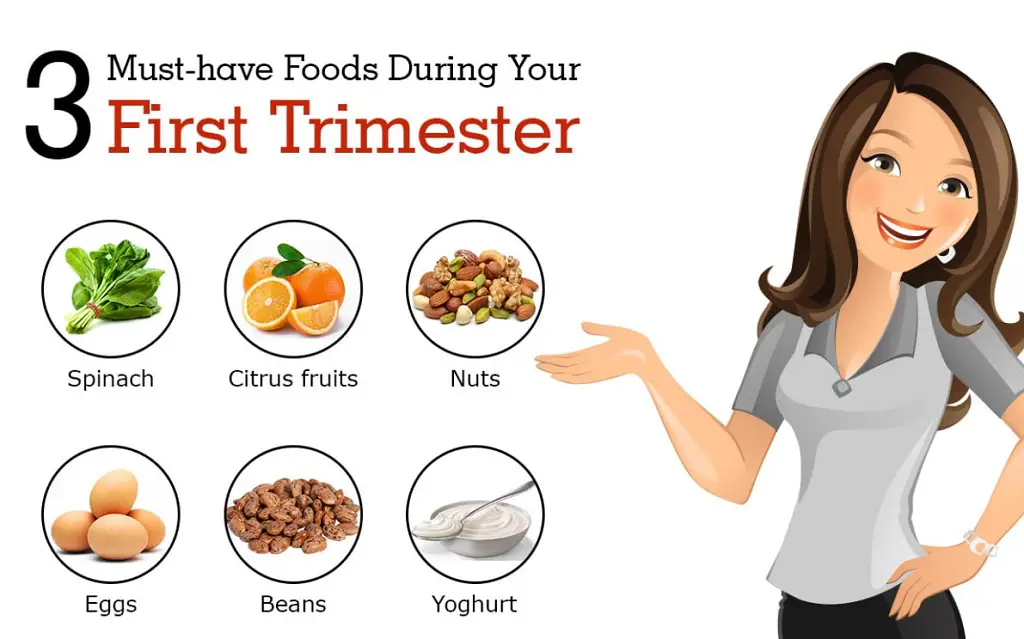
What Are The Superfoods for The First Trimester of Pregnancy?
Superfoods are high in nutrients. It has numerous health benefits. Include superfoods in your first-trimester diet plan. It helps you to have a healthier pregnancy. Here are some superfoods to keep in mind about:
Chia Seeds and Walnuts
Omega-3 fatty acids, fiber, and protein are present in these. You can add the seeds and nuts to smoothies, muesli, or yogurt to boost their nutritional content.
Greek Yogurt
Greek yogurt is high in protein. It also provides probiotics. It also supports digestive health. Choose plain, unsweetened yogurt to avoid added sugars.
Salmon
Salmon is a quality source of omega-3 fatty acids. These fats develop in the baby’s nervous system. They also reduce inflammation.
Sweet Potatoes
You will find beta-carotene in sweet potatoes. It is an antecedent of vitamin A. They benefit the development of the baby. They also provide fiber and vitamins C and B6.
Quinoa
Quinoa is a whole grain that is a protein. It contains all the essential amino acids. It’s also high in fiber and minerals.
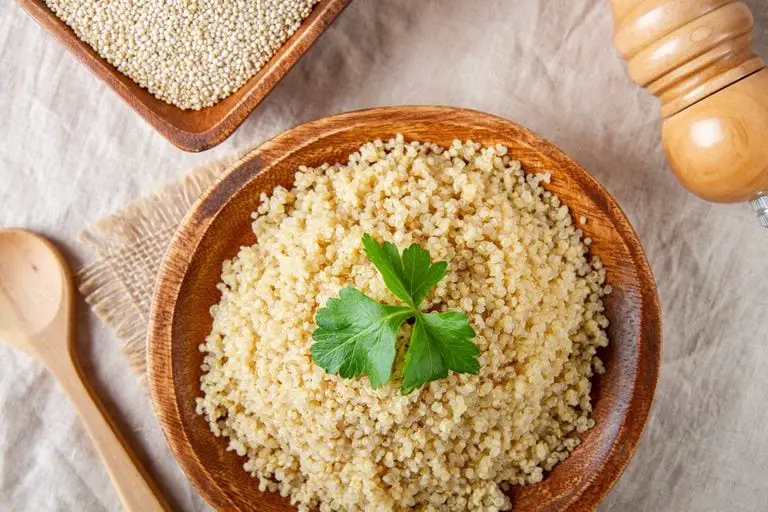
Spinach and Broccoli
Spinach and broccoli contain iron, calcium, and folate. Also contain vitamins A and C. These match nicely in salads, smoothies, and omelets. Spinach and broccoli are both low in saturated fat. They are high in carbohydrates. They are also high in fiber, with 2.2 g per 100 grams of spinach and 2.6 g per 100 grams of broccoli.
Lean Turkey
Iron and zinc are also present in lean turkey. It is a high-protein meal. The growth and development of the baby depend on these nutrients. 2.53 mg of zinc is found in a 100-gram serving of 93% lean ground turkey.
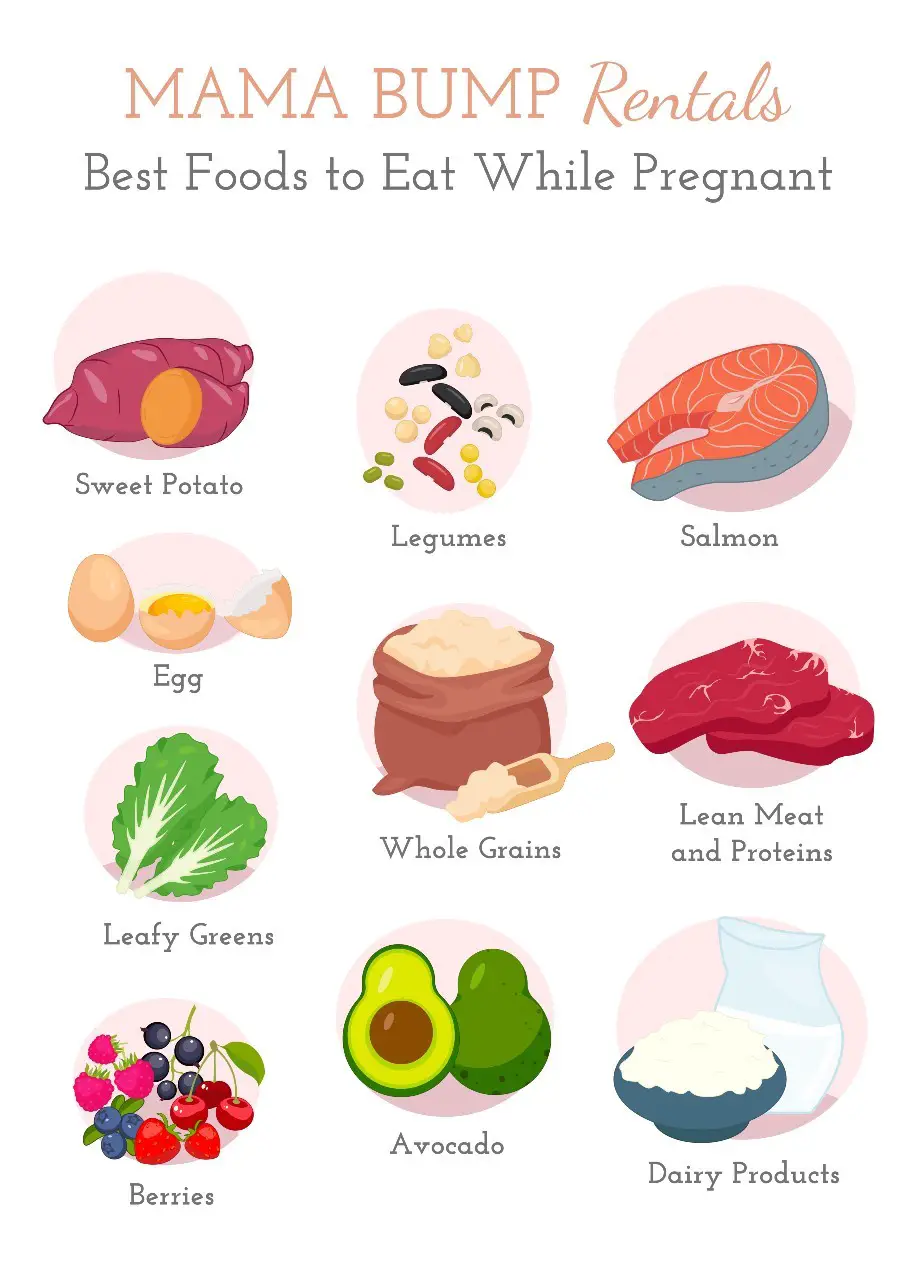
What to Avoid During Early Pregnancy to Prevent Miscarriage?
During early pregnancy, avoid smoking, excessive caffeine consumption. Also, avoid chemical contact. Check with your doctor before taking any medications. Ensure they are safe for pregnancy. There are numerous food restrictions, particularly during the first trimester. So Which Foods to Avoid in Pregnancy?
Here is a list of foods that you should avoid:
High Mercury Fish:
Certain fish, like sharks, swordfish, king mackerel, and tilefish, contain high levels of mercury. These will harm the developing nervous system of the fetus.
Raw or undercooked seafood and eggs:
Consumption of raw or undercooked seafood and eggs impacts the risk of salmonella. To eliminate possible bacteria, ensure to cook seafood perfectly.
Unpasteurized dairy products:
Soft cheeses like brie, camembert, and blue cheese contain listeria and other dangerous bacteria. Choose hard cheeses. Make sure the soft cheeses are made with pasteurized milk.
Alcohol:
Consuming alcohol causes a higher chance of miscarriage. It also brings problems for the growing baby. So, don’t drink alcohol during the first trimester of pregnancy. Better avoid it throughout the whole pregnancy.
Smoking and Illicit Drugs:
Smoking and the use of illicit medicine cause miscarriage. It leads to severe consequences for fetal development. Quitting these substances is essential for a healthy pregnancy.
Deli Meats:
Deli meats are contaminated with listeria. So it’s advisable to heat them until steaming before consumption.
Excessive Intake of Artificial Sweeteners:
While certain sugar substitutes are safe in small amounts, excessive intake has adverse effects. If necessary, use natural sweeteners like honey or maple syrup.
Unpasteurized Juice:
Similar to dairy products, unpasteurized juices contain harmful bacteria. Choose pasteurized juices to reduce any complications.
Unwashed Sprouts:
Raw sprouts, including alfalfa and mung bean sprouts, carry bacteria. It causes foodborne illnesses. Cooking sprouts completely reduce contamination.
Excessive Vitamin A:
While vitamin A is necessary for the development of babies, excessive consumption causes congenital disabilities. Avoid high-dose vitamin A supplements and limit the consumption of liver. It is rich in this vitamin.
Excessive Caffeine:
If you are expecting, you can consume coffee. There is no problem with drinking it. But be careful! Overconsumption increases the chance of miscarriage. You can consume caffeine that is not more than 200 milligrams. That means one 12-ounce cup of coffee.
High-sugar and Processed Foods
High sugar and processed foods increase the risk of gestational diabetes and lead to uncontrollably high weight gain.
Unwashed Product:
Wash fruits and vegetables before eating to reduce the risk of foodborne illnesses. It will help to remove contaminants.
Excessive Salt:
High salt consumption contributes to water retention and high blood pressure. Limit processed and salty snacks and search for fresh, whole foods.
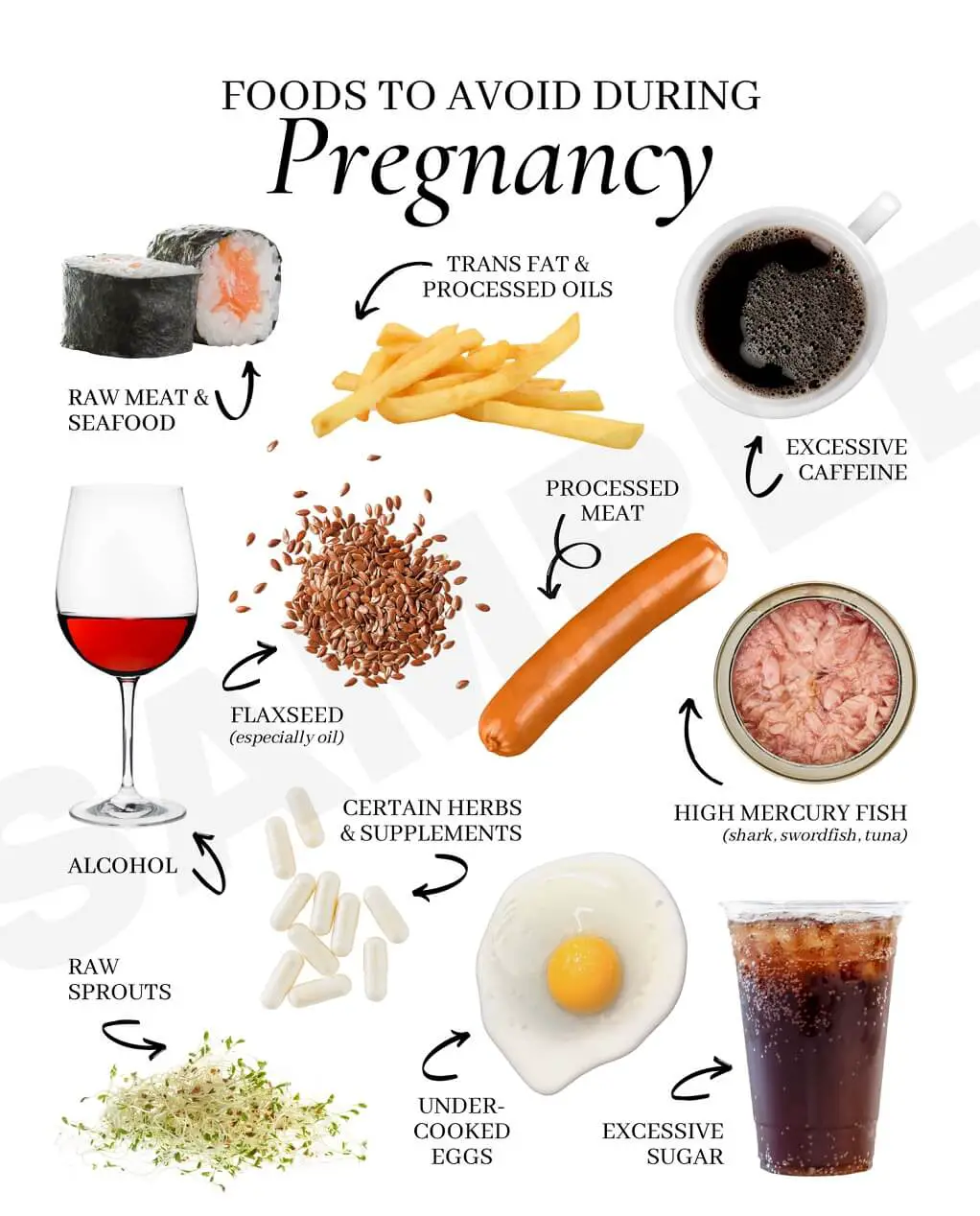
What Should I Eat on My First Trimester Chart?
Creating a balanced eating chart for the first trimester ensures you meet your nutritional needs. American College of Obstetricians and Gynaecologists (ACOG) states that women carrying one baby gain 1 to 5 pounds in the first trimester. Here’s the eating chart for the initial days of pregnancy:
| Meal | Liquid Foods | Solid Foods | Foods to Avoid |
| Breakfast | Fruit smoothie with milk or yogurt | Whole grain toast with avocado or peanut butter | High-mercury fish (shark, swordfish, king mackerel) |
| Low-sugar vegetable juice | Oatmeal with berries and nuts | Raw or undercooked seafood | |
| Herbal tea or water | Greek yogurt with granola and fresh fruit | Unpasteurized dairy products | |
| Homemade yogurt with berries. Sprinkle a little chia seeds and black cumin on top of that. | Raw or undercooked eggs | ||
| Mid-Morning Snack | Coconut water, coconut milk or infused water | Handful of nuts and seeds | Unpasteurized soft cheeses |
| Fresh fruit (e.g., apple, banana) | Cheese and whole grain crackers | Excessive caffeine | |
| Lunch | Vegetable soup or broth | Grilled chicken or tofu salad with a variety of veggies | Alcohol |
| Smoothie with greens, fruits, and yogurt | Quinoa or brown rice
Or avocado wrap |
Deli meats, unless heated | |
| Water or herbal tea | Steamed or roasted vegetables | High-sugar and processed foods | |
| Lentils or beans | Avoid overconsumption of chia seeds. It may lead to severe constipation. | ||
| Afternoon Snack | Yogurt parfait with berries | Whole grain crackers with hummus | |
| Hummus with carrot and cucumber sticks | Cottage cheese with pineapple | ||
| Almond milk or a small handful of almonds | Whole fruit, such as an orange or apple | ||
| Dinner | Broccoli and cheese soup | Baked or grilled fish with lemon | |
| Herbal tea or warm water with lemon | Sweet potato or quinoa | ||
| Grilled vegetables with olive oil dressing | Spinach or kale salad with nuts and a light vinaigrette | ||
| Evening Snack | Warm milk with a pinch of turmeric | Greek yogurt with a drizzle of honey and berries | |
| Whole grain toast with almond butter | Sliced apple with nut butter | ||
| Chamomile tea or water | Popcorn (plain, without excessive butter or salt) |
Frequently Asked Questions (FAQs)
What should you eat during pregnancy to have a healthy baby?
Eat fruits and vegetables. Also add to your menu whole grains, lean proteins, and dairy. Include folate-rich foods in your diet to aid in neural tube development. Consume calcium-rich foods for bone health. Consume iron-rich foods to avoid anemia. Try to intake omega-3 fatty acids for brain and eye development. Don’t forget to consume enough protein. Stay hydrated. Cut down on your caffeine intake and avoid alcohol.
How many calories should a pregnant woman eat?
The calories a pregnant woman can consume varies. It is based on before-pregnancy weight, activity level, and overall health. Generally, it helps if you have no additional calories during the first trimester. Focus on eating a well-balanced diet to support the early stages of pregnancy. During the second trimester, consume 340 more calories per day. Consume an additional 450 calories per day during the third trimester.
Conclusion
Expectant mothers build a strong foundation for a successful pregnancy by choosing the best food to eat during the first trimester. So, if you are expecting, ask about dietary choices and consult with medical experts. Remember that every pregnancy is different. So, for the best results, adapt dietary preferences to your particular needs and seek specific guidance from your doctor. One more thing: take it easy on yourself and focus on your body, especially if nausea or morning sickness strikes. Eating well will be much easier because you won’t be as sick in the second trimester.

